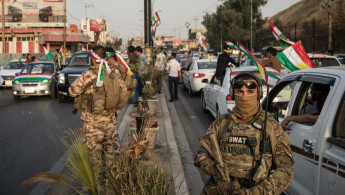Baghdad orders Iraqi-Kurdistan to 'surrender its airports'
Iraq's government has threatened punitive measures against the country's autonomous Kurdish region following Monday's controversial independence referendum.
1 min read
Baghdad opposed Iraqi Kurdistan's referendum which was held on Monday [Getty]
Iraq's prime minister threatened to enforce a flight shutdown on the country's Kurdish region on Tuesday, if it did not surrender control of two international airports by Friday.
The ultimatum comes after the northern region's Kurdish government held a controversial referendum on independence which was opposed by Baghdad.
Prime Minister Haider al-Abadi said that the ban would not be imposed on humanitarian and other "urgent" flights.
Monday's non-binding referendum was held by the Kurdistan Regional Government despite opposition from Iraq's federal government, Turkey, Iran and the United States.
Baghdad has said it does not recognise the referendum, while Turkey and Iran have threatened sanctions against the Kurdish region, including the closure of borders and flight bans.
The ultimatum comes after the northern region's Kurdish government held a controversial referendum on independence which was opposed by Baghdad.
Prime Minister Haider al-Abadi said that the ban would not be imposed on humanitarian and other "urgent" flights.
Monday's non-binding referendum was held by the Kurdistan Regional Government despite opposition from Iraq's federal government, Turkey, Iran and the United States.
Baghdad has said it does not recognise the referendum, while Turkey and Iran have threatened sanctions against the Kurdish region, including the closure of borders and flight bans.
The Kurdish Regional Government currently operates international airports in the autonomous Kurdish region's capital, Erbil, and in the city of Sulaimaniyah.
With its own army, the KRG is also in control of some of Iraq's most lucrative oil fields.
The results of Monday's referendum are yet to be released, however, it is believed that the "yes" vote will win comfortably.
Despite the result not being binding on Baghdad, however, it is thought that Kurdish leader Massoud Barzani will use a possible "yes" victory to bolster his negotiating position with Baghdad in talks about Iraqi-Kurdistan's future.





 Follow the Middle East's top stories in English at The New Arab on Google News
Follow the Middle East's top stories in English at The New Arab on Google News
![The UAE is widely suspected of arming the RSF militia [Getty]](/sites/default/files/styles/image_330x185/public/2024-11/GettyImages-472529908.jpg?h=69f2b9d0&itok=Yauw3YTG)
![Netanyahu furiously denounced the ICC [Getty]](/sites/default/files/styles/image_330x185/public/2024-11/GettyImages-2169352575.jpg?h=199d8c1f&itok=-vRiruf5)
![Both Hamas and the Palestinian Authority welcomed the ICC arrest warrants [Getty]](/sites/default/files/styles/image_330x185/public/2024-11/GettyImages-2178351173.jpg?h=199d8c1f&itok=TV858iVg)